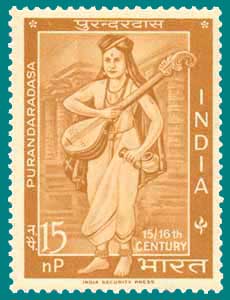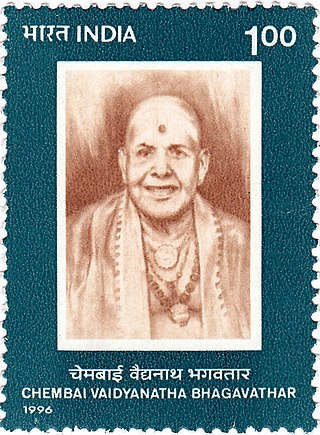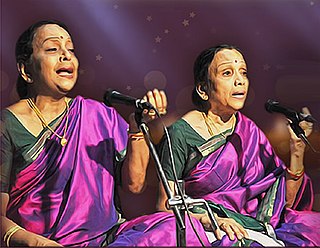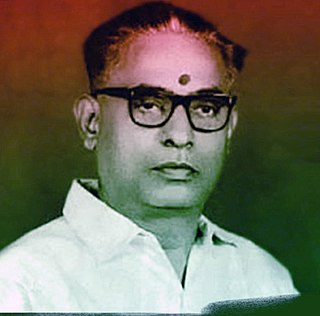
Ambujam Krishna (1917 - 1989 [1] ) was a composer of Carnatic Kritis. She has composed more than 600 kritis in various Carnatic ragas. [2]

Ambujam Krishna (1917 - 1989 [1] ) was a composer of Carnatic Kritis. She has composed more than 600 kritis in various Carnatic ragas. [2]
Ambujam Krishna is the daughter of K. V. Ranga Iyengar, an advocate of Madurai. She had her music training under Karaikudi Ganesan and Ganesha Bhagavathar. She married T. S. Krishna who was an industrialist and son of T. V. Sundaram Iyengar. [3] She graduated in Home Science from the Delhi University. [2] Industrialist Suresh Krishna is her son. [4]
Ambujam Krishna has written kritis in various languages such as Sanskrit, Kannada, Tamil and Telugu. She has also written songs with more than one language in the same song. It is called Manipravalam in Tamil. Her works have been published in two volumes under the title Geetamala.
Her lyrics have been set to music by various masters such as Sri Semmangudi Srinivasa Iyer, V. V. Sadagopan, S. Ramanathan, T. N. Seshagopalan, and others. [2] She was a senior office bearer of Sri Sathguru Sangeetha Samajam, Madurai. She started a music college Satguru Sangeetha Vidyalayam as a wing of the sabha. [4]

Thyagaraja, also known as Thyāgayya and in full as Kakarla Thyagabrahmam, was a composer and vocalist of Carnatic music, a form of Indian classical music. Tyagaraja and his contemporaries, Shyama Shastri and Muthuswami Dikshitar, are regarded as the Trinity of Carnatic music. Tyagaraja composed thousands of devotional compositions, most in Telugu and in praise of Rama, many of which remain popular today, the most popular being "Nagumomu". Of special mention are five of his compositions called the Pancharatna Kritis, which are often sung in programs in his honour, and Utsava Sampradaya Krithis, which are often sung to accompany temple rituals.

Purandara Dasa was a composer, singer and a Haridasa philosopher from present-day Karnataka, India. He was a follower of Madhvacharya's Dvaita philosophy. He was one of the chief founding proponents of Carnatic music. In honor of his significant contributions to Carnatic music, he is widely referred to as the Pitamaha of Carnatic music. According to a legend, he is considered as an incarnation of Narada.

Madurai Thirumalai Nambi Seshagopalan is a noted Carnatic singer, musician and composer. He was awarded the Madras Music Academy's Sangeetha Kalanidhi in 2006. As well as being a master of the veena and harmonium, he is an exponent of harikatha.

Thyagaraja Aradhana is an annual aradhana of Telugu saint composer Tyagaraja. The music festival is observed in the states of Andhra Pradesh, Karnataka and Tamil Nadu, primarily in Tiruvaiyaru in Thanjavur district of Tamilnadu, the place where Tyagaraja attained Jeeva Samadhi. The aradhana is observed on Pushya Bahula Panchami day when the saint attained Jeeva samadhi, where the musicians render the saint's Pancharatna Kritis.
Harikesanallur Muthiah Bhagavatar, commonly known as Muthiah Bhagavatar, is one of Carnatic classical music's famous twentieth-century composers. He also created about 20 ragas.

Lalgudi Gopala Jayaraman was an Indian Carnatic violinist, vocalist and composer. He is commonly grouped with M.S. Gopalakrishnan and T.N.Krishnan as part of the violin-trinity of Carnatic Music. He was awarded Padma Bhushan by the Government of India in 2001.

Chembai Vaidyanatha Bhagavatar was an Indian Carnatic music singer from Palakkad. Known by his village name Chembai, or simply as Bhagavatar, he was born to Anantha Bhagavatar and Parvati Ammal in 1896, into a Tamil Brahmin family in Perakkool Madom, adjacent to Lokanarkavu near Vatakara on Janmashtami day. He lived here until he was five years old. The family later shifted to Palakkad. Chembai was noted for his powerful voice and majestic style of singing. His first public performance was in 1904, when he was nine. A recipient of several titles and honours, he was known for his encouragement of upcoming musicians and ability to spot new talent. He was responsible for popularising compositions like Rakshamam Saranagatam and Pavana Guru, among others. The music critic 'Aeolus' described him as "the musician who has meant the most to Carnatic Music in the first fifty years of the 20th century." His prominent disciples include Chembai Narayana Bhagavathar, Mangu Thampuran, Guruvayur Ponnammal, T. V. Gopalakrishnan, V. V. Subramaniam, P. Leela, K. G. Jayan, K. G. Vijayan, K. J. Yesudas, Kudumaru Venkataraman and Babu Parameswaran, among others. He also mentored many young accompanists, including Palghat Mani Iyer, Lalgudi Jayaraman, M. S. Gopalakrishnan, T. N. Krishnan, Palani Subramaniam Pillai and L. Subramaniam. Memorial music festivals have been held in his honour annually since his death in 1974, the most important being the annually celebrated Chembai Sangeetholsavam.
Kalpakam Swaminathan was a vainika of Carnatic music.

Oothukkaadu Venkata Kavi or Oottukkaadu Venkata Subramanyar was one of the pioneering composers in Indian classical Carnatic music. He lived in South India in the present-day state of Tamil Nadu. Also known by the name Oothukkaadu Venkatasubramaniya Iyer, he composed hundreds of compositions in Sanskrit and Tamil of which over 500 are available. These were handed down from generation to generation by the descendants of the composer's brother's family.
S. Ramanathan (1917-1988) was a Carnatic music singer and musicologist. He was awarded the Sangeetha Kalanidhi title in 1985 by Madras Music Academy.
Koteeswara Iyer, was a pioneer composer of Indian classical music Carnatic music. He was a grandson of Kavi Kunjara Bharati(1810–1896) attributing to a strong lineage of accomplished musicians. He was born in Nandhanur to Nagarathinam iyer who was a Sivagangai Samasthana Sangeetha Vidwan. His ancestors lived initially in Tirunelveli and later in Raja Hiranya Garba Thirumalai Sethupathi's village in Perungarai (Ramanathapuram). Koteeswara Iyer studied music under Poochi Srinivasa Iyengar (1860–1919) and Patnam Subramania Iyer (1845–1902). He composed mainly in the Tamil language and used the mudraKavi Kunjara Dasan in tribute to his grandfather. While studying his BA in English Literature in Trichy, Koteeswara Iyer started performing in small Kutcheries singing Kavi Kunjara Bharathi's Skanda Puranam, Perinba Keerthanaigal. Noted devotional singers K. Somu (Somasundaram) and K. Veeramani were the grandsons of Koteeswara Iyer, and thus the great-great grandsons of Kavi Kunjara Bharathi.

"Bombay" Jayashri Ramnath is an Indian Carnatic vocalist, singer, and musician. She has sing in multiple languages, including Tamil, Telugu, Kannada, Malayalam and Hindi movies. Born into a family of musicians, Jayashri represents the fourth generation of music practitioner's in her family. Trained by Lalgudi Jayaraman and T.R. Balamani. She was awarded India's fourth highest civilian award, the Padma Shri, in 2021. In December 2023, she was awarded the most prestigious award in the Carnatic Music Field, the Sangeetha Kalanidhi, by the Madras Music Academy. She has become one of the most sought-after Carnatic musicians today.

Nagapattinam Chandrashekharan Vasanthakokilam was a Carnatic singer and actress. Her work included the performances of kritis by Tyagaraja and Muthuswami Dikshitar and in the years after Indian independence, she helped popularise the famous mystic poet of Tamil Nadu, Kavi Yogi Maharishi Dr. Shuddhananda Bharati's songs. She died of tuberculosis in 1951.

Porayath Leela was an Indian playback singer, Carnatic vocalist, and a music director. She has recorded more than 5,000 songs in various Indian languages including Malayalam, Telugu, Tamil, Kannada, Hindi, Bengali, Sanskrit, Odia, Gujarati, Marati. and also Sinhale. She is also known for her extensive history of collaboration in the songs with Music Composers v.Dakshinamoorthy, MS Baburaj, G Devarajan, ghantasala, MS Viswanathan, K. Raghavan, Br Lakshmanan, LPR Varma, BA chithambara athletes, AT ummer, MK Arjun,Johnson, ouseppachan, ilaiyaraja, and with the playback singers KJ Yesudas and Ghantalasa over the years. Leela is known for her sweet and melodious voice that she named Ganamani. She was awarded Padma Bhushan in 2006. She made her debut as a playback singer in the 1948 Tamil film Kangkanam.

The Bombay Sisters, C. Saroja and C. Lalitha (26 August 1938 – 31 January 2023), were an Indian Carnatic music singing duo. They received the Padma Shri, India's fourth highest civilian honour, in 2020.

Vijayalakshmy Subramaniam is an Carnatic music vocalist. As a student and performer of classical music for over three decades, she has performed extensively in India and abroad since the age of twelve. She has conducted numerous workshops and lecture demonstrations on the various aspects of Carnatic Music. She has presented papers at international conferences in many countries over the last decade. In June 2007, she brought out a book "Apoorva Kriti Manjari" – a collection of twenty rare compositions of the Trinity of Carnatic Music. The book has notations in English and Tamil by musicologist S. Balachander and the audio has been rendered by Vijayalakshmy. A doctorate in music, Vijayalakshmy was awarded the Fulbright Visiting Lecturer Fellowship in 2010. As part of the programme, she taught the subject 'An Introduction to Indian Music' at the Duke University, North Carolina, USA, as a visiting Fulbright fellow.
Salem K. Meera is a Carnatic musician in Salem. She is well-versed in vocal, veena and keyboard. Meera has composed many swarajathis, varnams, thilanas and Tamil songs. She has been running a music school named after her parents, Sri Gowri Kanakasabapathy Gana Vidya Nilayam, at her residence since 2 February 1977 and has continually trained thousands of students in Carnatic vocals, veena and keyboard. The school encourages a lot of group study with a good guru–student relationship. She has been the joint president of Salem Sangeetha Vidwath sabha for the past three years. She also served as the president of the sabha for six years and secretary for six years, as well as committee member and vice president for 12 years. She is an active and creative participant in the sabha activities. She has been performing in the Salem sabha from 1950 until now (2011).

Vellore G. Ramabhadran was a Mridangam artiste from Tamil Nadu, India. He was awarded the Madras Music Academy's Sangeetha Kalanidhi in 2004.

Balasubramaniam Rajam Iyer was a Carnatic singer from South India. He was awarded the Madras Music Academy's Sangeetha Kalanidhi in 1987.

Veeravanallur Vedantam Sadagopan was an Indian university rank-holder, ICS aspirant, film actor, music teacher, performer, and composer.